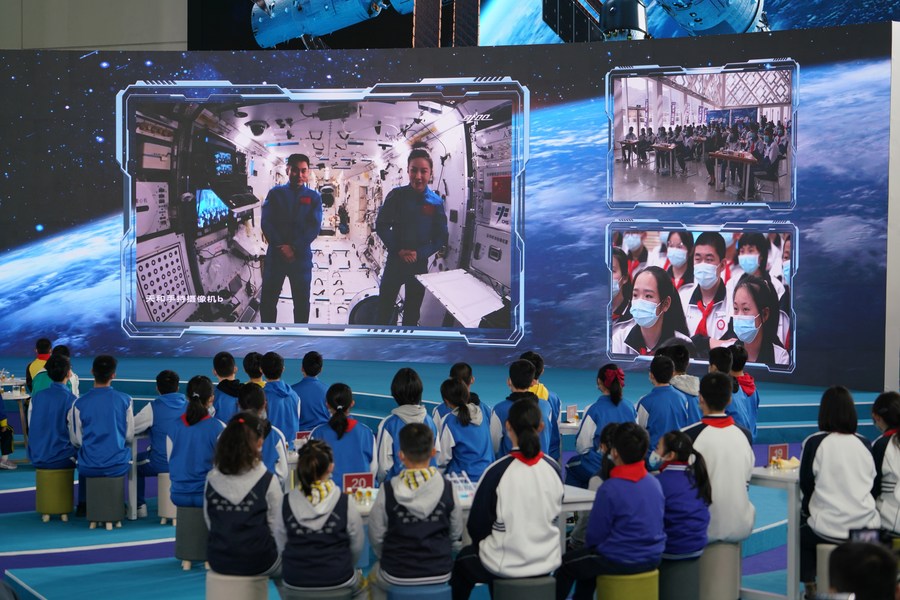
Students attend a livestreamed popular-science lecture given by Chinese astronauts from the Tiangong space station, at the China Science and Technology Museum in Beijing, March 23, 2022. (Xinhua/Guo Zhongzheng)
TAIYUAN, Sept. 24 (Xinhua) — Sun Lan has been a space enthusiast ever since she was a child and learned a great deal about it from books, but there were still many questions that remained unresolved for the 16-year-old student.
Fortunately, she found answers to most of her questions at a lecture delivered by Shen Liping, former deputy chief engineer of China’s manned space program, last week.
Speaking at the Jiao Cheng No.1 Middle School in Jiaocheng County, north China’s Shanxi Province, Shen shed light on the history of the country’s manned space program and its future projects and answered questions from the students.
“I was touched by the spirit of scientists and astronauts after learning about aerospace science at the lecture. This is a lecture that will benefit me for life,” Sun said.
The lecture was one of the initiatives by the Chinese Society of Space Research for the promotion of science in Shanxi Province. Top scientists and experts from the field of space science will deliver a series of lectures to students from eight schools this month.
This year is the 30th anniversary of China’s manned space program. China’s aerospace industry has achieved breakthroughs in spacecraft launches and astronaut spacewalks, and is making efforts in large-scale space science experiments.
The achievements have ignited enthusiasm among Chinese youth, encouraging them to pursue their space dreams.
After her graduation, 26-year-old Shi Yurong joined the National Space Science Center, Chinese Academy of Sciences, to work on space environment forecasting.
In addition to conducting scientific research on space environment monitoring and forecasting, her team is also responsible for space environment monitoring for many major space missions in China.
“As a child, I was thrilled to watch rocket launches on television, and now I can contribute to space science. I feel fortunate and honored,” said Shi, adding that the promotion and popularization of space science encouraged her to pursue a career in the relevant field.
“I think the development of science and technology in a country depends on generations of young people getting to know science, falling in love with it, and devoting themselves to the domain,” Shi added.
Space science is now more accessible to Chinese teenagers. Yang Liwei, China’s first space traveler, conducted an aerospace-themed science class for teenagers at the China Science and Technology Museum on National Science Popularization Day this month. More than 280,000 teenagers watched the class through live broadcasts.
Zhihu, a Quora-like knowledge-sharing platform in China, recently launched an initiative concerning space science. A number of aerospace experts shared space-related knowledge and the country’s aerospace achievements with the netizens.
China will continue to promote science popularization. By 2035, the proportion of citizens with scientific literacy will reach 25 percent, and the high-quality development of popular science services will be significantly improved, according to a guideline on strengthening popularization of science and technology in the new era released by the central authorities .
The country’s achievements in science and technology will foster the popularization of science to cultivate scientific spirits and innovative thinking among the public, said Yu Dengyun, deputy chief designer of China’s lunar exploration program. ■
.